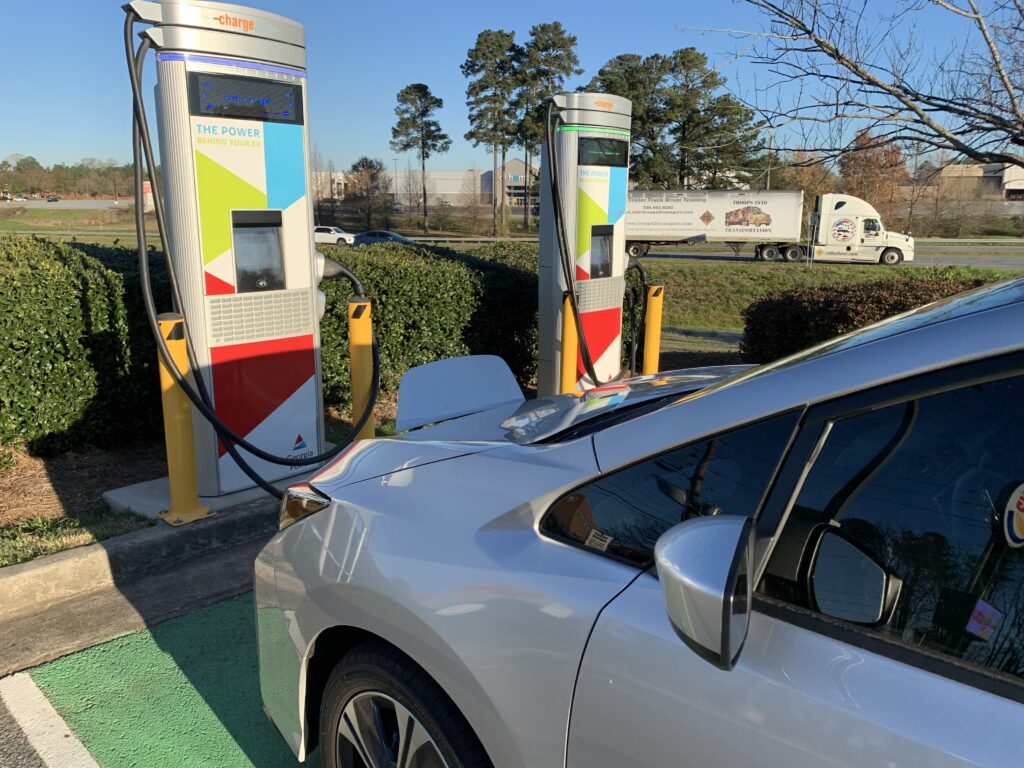This coverage is made possible through a partnership with WABE and Grist, a nonprofit, independent media organization dedicated to telling stories of climate solutions and a just future.
Electric vehicle advocates are cheering a bill that advanced out of a state House committee last week that would change how EV charging works in Georgia.
Currently, when EV owners plug their cars into a public charging station, they pay for the amount of time they’re plugged in. Under House Bill 406, EV drivers would instead pay for the amount of power they use – the same way other drivers pay for gas by the gallon.
Supporters of the industry say this is an important step forward that would make driving EVs more fair and simple. Charging companies, power companies, convenience stores and EV advocates and manufacturers have all applauded this change.
But some issues remain.
Since the Georgia Department of Transportation relies on gas taxes for funding, the bill would impose a similar tax on EV charging. But EV owners already pay a $211 annual fee to compensate for the lost gas tax revenue.
“Further taxing EV drivers is punitive,” said Anne Blair with the Electrification Coalition. “And we would want to see that, you know, pushed out and some equality put in place.”
One option: charging EV owners by how many miles they drive instead of a flat fee. GDOT is studying that idea.
The legislation would also let convenience stores get into the EV charging business – something they’ve been clamoring for. But that group still worries about competition from power companies like Georgia Power.
“There’s nothing to require [Georgia Power] to charge the same rate as a producer, distributor, and now a retailer,” said Angela Holland of the Georgia Association of Convenience Stores at a recent hearing. “So will we be able to compete?”
Advocates say questions like these are inevitable as electric vehicles grow in popularity and the auto industry increasingly goes electric.
“There’s a lot of things we are having to figure out…some trial and error on what systems work best,” said Blair. “And so I think we need some flexibility in this process.”
With such questions still outstanding, some at last week’s hearing on HB 406 asked for more time. As it’s currently written, most of the bill would take effect July 1, with the excise tax on vehicle charging kicking in next year.
The Georgia Department of Agriculture, which certifies gas pumps around the state to ensure drivers are charged accurately, would perform the same role for EV chargers beginning in 2025. But an Agriculture Department representative told lawmakers the agency would need more time to hire staff and source the necessary equipment.
The legislation advanced out of the House Technology and Infrastructure Innovation Committee last week and now heads to the full House.
The bill arose out of the work of a study committee last year that looked at a wide range of issues stemming from the growing electrification of transportation.
It also comes amidst a federal push for electric vehicles as a way to reduce carbon emissions to tackle climate change. The infrastructure law President Biden signed in 2021 includes EV charging infrastructure funding and requires that those charges be priced by the kilowatt-hour, or amount of power, not by time.
The Inflation Reduction Act passed last year, meanwhile, extends tax credits for EV buyers. The Biden administration has also sought to boost EVs by electrifying vehicles in the federal fleet.
While Georgia does not have EV incentives or emissions reduction goals, the state has sought to capitalize on the industry’s growth by drawing EV and battery makers to the state. That’s another reason advocates say Georgia needs to update its EV policies and avoid overlapping taxes for EV drivers: soon, those cars will be made here.
“We’re investing a lot in manufacturing and infrastructure, and we don’t want that to impede the ability of individuals to get in cars,” Blair said.









